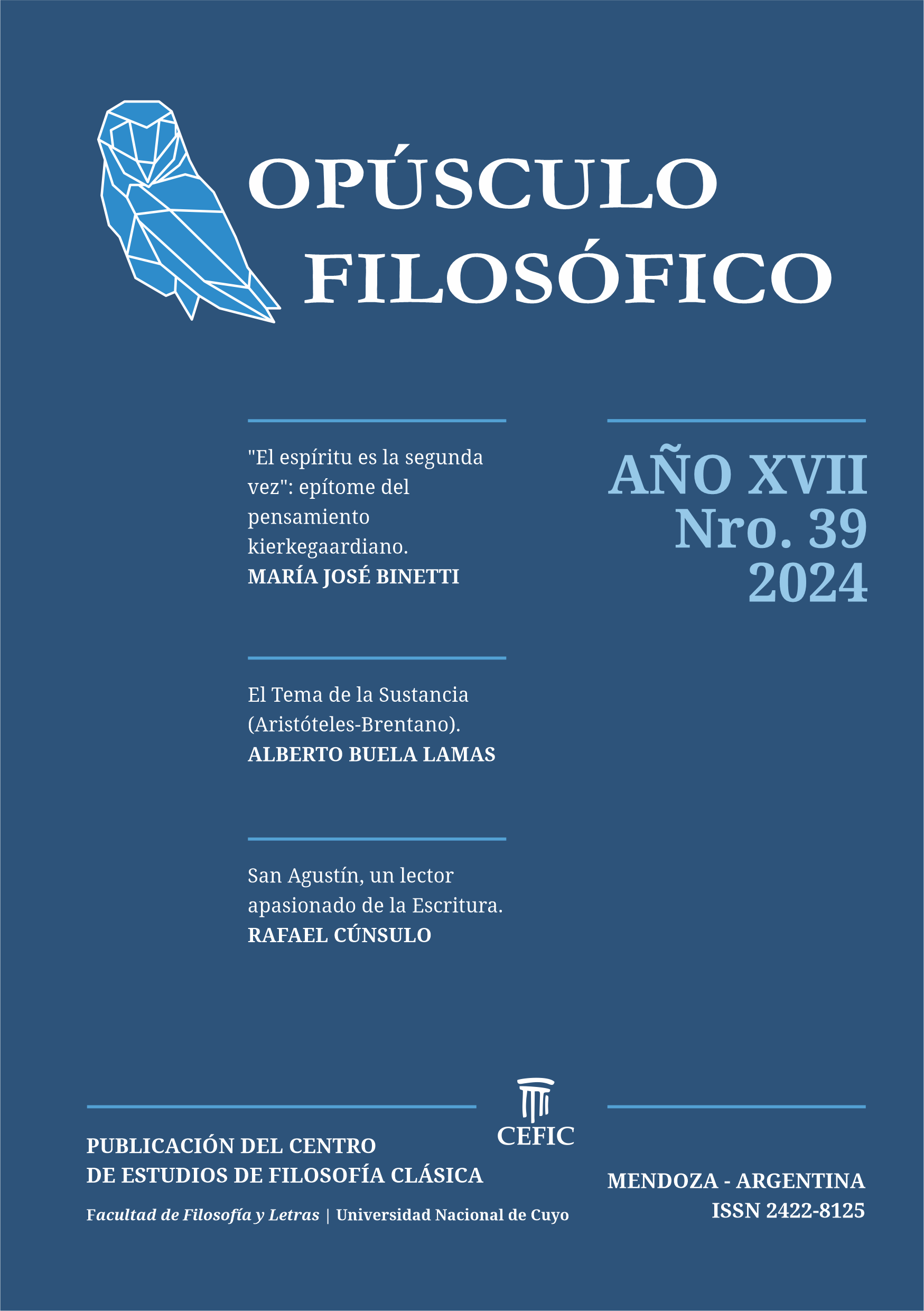“The Spirit is the second Time”: Epitome of Kierkegaardian Thought
Keywords:
existence, idea, consciousness, mediation, reflection, repetitionAbstract
This article aims at an extended reading of a Kierkegaardian definition that appears twice in his Journals and runs through his entire thinking and work: “the spirit is the second time”. With it, Søren Kierkegaard establishes the plane of consistency of his existentialism and opens a conceptual key to its other categories. I will try to project Kierkegaardian thought on the tradition of two great thinkers of the spirit, Aristotle and Georg W. F. Hegel, to conclude with the restorative power of a new contemporary existentialism, a continuation of them.
References
Aristóteles. (1998). Metafísica de Aristóteles (Trad. V. García Yebra). Gredos. Emmanuel, S., McDonald, W. y Stewart, J. (2015). Kierkegaard’s Concepts (Vol. 15, Tomo VI). Ashgate.
Gabriel, M. (2015). Why the World does not exist. Cambridge & Malden, Polity Press.
Gabriel, M. (2018). Neo-existentialism. How to conceive of the Human Mind after Naturalism’s Failure. Cambridge & Medford, Polity Press.
Gabriel, M. (2019). El sentido del pensamiento. Pasado y presente.
Gabriel, M. (2017). I am not a Brain. Philosophy of Mind for the 21st. Century. Cambridge & Malden, Polity Press.
Gabriel, M. (2022). Ficciones. UNSAM Edita.
Hegel, G. W. F. (1978). Escritos de juventud. Fondo de Cultura Económica.
Hegel, G. W. F. (1992). Fenomenología del espíritu. Fondo de Cultura Económica.
Hegel, G. W. F. (2005). Enciclopedia de las ciencias filosóficas en compendio: para uso de sus clases (Trad. R. Valls Plana). Madrid, Alianza.
Hölderlin, F. (2017). Ensayos (Trad. Felipe Martínez Marzoa). Hiperión.
Jaeschke, W. (1998). Hegel. La conciencia de la modernidad (Trad. A. Gomez Ramos). Akal.
Kaufmann, W. (1980). Goethe, Kant and Hegel. Discovering the Mind (Vol. 1). Transaction Publishers.
Kierkegaard, S. (1909-1948). Søren Kierkegaard Papirer (Ed. P. A. Heiberg, V. Kuhr y E. Torsting, 2ª ed.). 20 vols. Gyldendal.
Kierkegaard, S. (1997-2013). Søren Kierkegaard Skrifter (Ed. Niels Jørgen Cappelørn, Joakim Garff, Jette Knudsen, Johnny Kondrup, Alastair McKinnon). 28 vols. Gads Forlag.
Malabou, C. (2012). The New Wounded. From Neurosis to Brain Damage (Trad. S. Miller). Fordham University Press.
Michelet, K. L. (1840). Anthropologie und Psychologie oder die Philosophie des subjektiven Geistes. Sanderschen Buchhandlung.
Rodríguez, A. (2001). ‘Persona’ e ‘Individuo concreto’ en el pensamiento de G.W.F. Hegel. Universidad Nacional de Cuyo.
Rosenkranz, K. (1837). Psychologie oder die Wissenschaft vom subjektiven Geist. Gebrüder Bornträger.
Žižek, S. (2006). The Parallax View. MIT Press.
Žižek, S. (2014). Absolute Recoil. Towards A New Foundation of Dialectical Materialism. Verso.
Žižek, S. (2019). Sex and the Failed Absolute: Capital of Fashion. Blomsbury
Downloads
Published
How to Cite
Issue
Section
License

This work is licensed under a Creative Commons Attribution-NonCommercial 4.0 International License.
Esta obra está bajo una Licencia Creative Commons Atribución-NoComercial 4.0 Internacional.
Los/as autores/as que publican en esta revista están de acuerdo con los siguientes términos:
Los usuarios son libre de:
Compartir — copiar y redistribuir el material en cualquier medio o formato
Adaptar — remezclar, transformar y construir a partir del material
La licenciante no puede revocar estas libertades en tanto usted siga los términos de la licencia
Bajo los siguientes términos:
Atribución — Usted debe dar crédito de manera adecuada, brindar un enlace a la licencia, e indicar si se han realizado cambios. Puede hacerlo en cualquier forma razonable, pero no de forma tal que sugiera que usted o su uso tienen el apoyo de la licenciante.
No Comercial — Usted no puede hacer uso del material con propósitos comerciales.
No hay restricciones adicionales — No puede aplicar términos legales ni medidas tecnológicas que restrinjan legalmente a otras a hacer cualquier uso permitido por la licencia.







